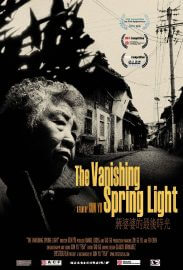Enjoy a free preview via Film Discovery! Click here !
Enjoy a free preview via Film Discovery! Click here !
Enjoy a free preview via Film Discovery! Click here !
Enjoy a free preview via Film Discovery! Click here !

https://www.filmplatform.net/product/vanishing-spring-light
A sensitively shot personal portrait which documents the parallel decline of the ageing matriarch Grandma Jiang and the old neighborhood where she grew up – set to disappear under the inexorable forward march of gentrification. After suffering from a sudden stroke, Grandma Jiang loses much of the independence she fought to maintain. As her health deteriorates, suppressed conflicts within the family bubble to the surface. The Vanishing Spring Light is a film about love and loss within a family, about obligations and blood ties, about guilt, change and fate.

Treatment
“Through the lens of a video camera, I attempt to document the simple lives on an ancient yet ordinary Chinese street, while undertaking an internal quest to comprehend life through documentary.” – Xun Yu
Up until Xun Yu’s first visit in 2008, the Street still preserved the residential and social structure of an ancient Chinese community. However it has been challenged by new values, mainly materialism, strongly in contrast with the residents’ traditional understandings of life. Such struggles were experienced daily by the residents. While desperately trying to adapt to the new Chinese way of living, they and their families have been constantly placed with new challenges. Such transformation reflected the struggle of this ancient civilization in the modern era, which also became the grand backdrop of the film.
This documentary project is intended as a four-part series, each one focuses on an individual character and his/her family on the street. While blending tightly into each other’s lives on the street as neighbors, they are facing their very own struggles in life. These four characters represent four generations of the residents on the street, as well as the four different phases of life according to the ancient Chinese metaphor: Birth, Adulthood, Aging and Dying.
“The Vanishing Spring Light” is the first of the series, a film about dying. During his two years stay on the street, Xun Yu became a very close friend with Grandma Jiang and her family. They kindly accepted him as a family member and allowed the same access of his camera into the very core of their lives, even at those most intimate and difficult moments. This supportive gesture from the family allows the film to obtain a privileged perspective, and the sincere interaction between the filmmaker and the protagonist has eventually transcended the boundary of a documentary.